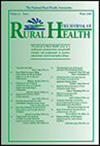Rural patients’ experiences with diagnosis and treatment of endometrial cancer
Abstract
Background
Rural endometrial cancer (EC) patients are less likely to receive lymph node evaluation, high-quality surgical care, and adjuvant therapy compared to urban patients. Developing interventions to effectively address barriers to quality care requires understanding patient experiences across the cancer care continuum. Our objective was to understand the diagnostic and treatment experiences of rural EC patients.
Methods
We conducted semistructured interviews with 23 participants (22 patients, one caregiver) from rural counties in North Carolina. We developed a semistructured interview guide to examine the experiences of patients during diagnosis and treatment. Initial codes were derived from a multilevel conceptual framework of rural cancer control, and transcribed interviews were analyzed using thematic analysis.
Results
We identified six themes reflecting determinants of diagnosis and seven themes for treatment of EC for rural patients. Provider knowledge of EC symptoms, patient symptom normalization, and fear were all discussed as major factors impacting delays in EC diagnosis. Participants noted that social networks influenced them to seek care for symptoms they did not otherwise see as concerning. During treatment, participants experienced financial burdens, and many reported significant challenges traveling to treatment. Social networks were critical for financial support and transportation to and from treatment. Personal health care experiences and community perceptions about rural cancer care also influenced decisions about where to seek gynecologic cancer treatment.
Conclusions
This study highlights the need to improve rural provider adherence to guidelines for EC detection, increase symptom knowledge among rural communities, and implement comprehensive assessments of unmet needs of rural patients during treatment.


 求助内容:
求助内容: 应助结果提醒方式:
应助结果提醒方式:


